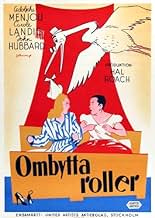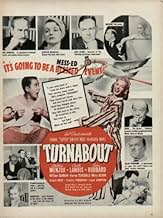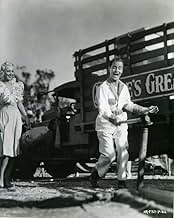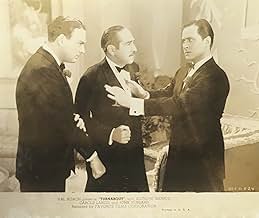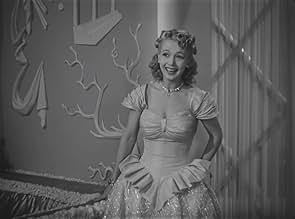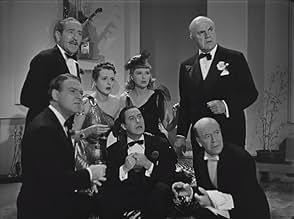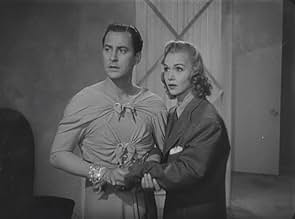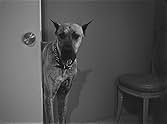CALIFICACIÓN DE IMDb
6.1/10
824
TU CALIFICACIÓN
Agrega una trama en tu idiomaBickering husband and wife Tim and Sally Willows mutter a few angry words to a statue of Buddha and wind up living each other's life.Bickering husband and wife Tim and Sally Willows mutter a few angry words to a statue of Buddha and wind up living each other's life.Bickering husband and wife Tim and Sally Willows mutter a few angry words to a statue of Buddha and wind up living each other's life.
- Dirección
- Guionistas
- Elenco
Opiniones destacadas
Although not a great film this is never the less, in its own way, unforgettable. The first section of the film plays as a light comedy and is amusing enough. As soon as the gender reversal fun begins, however, it moves into a different league - one which startles by the casual way it plays with sexual expectations and stereotyping.
The Willows' transformation (through the creaky genie device) is potentially explosive stuff and, to his credit, Roach successfully steers an innocent course between pantomime and farce. Although the sexual naivety of the film is obvious, to modern eyes the homosexual/lesbian resonance of the scenario is still very funny and, for its time, I think rather daring. Hubbard's fey alter ego especially is a joy to behold, and I am surprised that this film is not better known to lovers of gay camp.
Some elements of the supporting plot reinforces the echoes of sex and gender play too: the mix up with the pets for instance, prefiguring later confusions over role, or Willows' over-aggressive personal trainer, whose grappling is suggestive of an unwanted sexual encounter. Even the running joke of hiding drink from the wife suggests a furtive vice, again particularly apposite in context.
Menjou and Landis lend a touch of class to the proceedings, and although studio-bound, and not particularly realistic in scale, the set design is elegant and spacious. The otherwise (to me) unknown John Hubbard reminds me of Ed Wood in Glen or Glenda - it's that sort of film, where men slip on Angora sweaters and then light a pipe.
This is a project that is more successful exactly because it is directed by comedy veteran Roach. It would have perhaps emerged as a far safer, and therefore far less enjoyable vehicle in the hands of a larger studio or, if made by a director with a different background.
The Willows' transformation (through the creaky genie device) is potentially explosive stuff and, to his credit, Roach successfully steers an innocent course between pantomime and farce. Although the sexual naivety of the film is obvious, to modern eyes the homosexual/lesbian resonance of the scenario is still very funny and, for its time, I think rather daring. Hubbard's fey alter ego especially is a joy to behold, and I am surprised that this film is not better known to lovers of gay camp.
Some elements of the supporting plot reinforces the echoes of sex and gender play too: the mix up with the pets for instance, prefiguring later confusions over role, or Willows' over-aggressive personal trainer, whose grappling is suggestive of an unwanted sexual encounter. Even the running joke of hiding drink from the wife suggests a furtive vice, again particularly apposite in context.
Menjou and Landis lend a touch of class to the proceedings, and although studio-bound, and not particularly realistic in scale, the set design is elegant and spacious. The otherwise (to me) unknown John Hubbard reminds me of Ed Wood in Glen or Glenda - it's that sort of film, where men slip on Angora sweaters and then light a pipe.
This is a project that is more successful exactly because it is directed by comedy veteran Roach. It would have perhaps emerged as a far safer, and therefore far less enjoyable vehicle in the hands of a larger studio or, if made by a director with a different background.
Bickering husband and wife (John Hubbard, Carole Landis) have their minds switched thanks to a magic statue they call Mr. Ram. Landis is gorgeous, funny, and the primary reason to recommend this movie. Hubbard is OK but nothing special. The supporting cast includes Donald Meek, William Gargan, Franklin Pangborn, and Marjorie Main. Solid supporting actors all. Mary Astor appears in a wasted role as a friend of Landis' before The Maltese Falcon would reinvigorate her career the following year. Adolphe Menjou is annoying as a partner in the husband's ad agency. His entire role in the movie is yelling at various people. It gets old fast.
The madcap stuff doesn't really get underway until about midway through. The first 35-40 minutes is mostly setup, establishing these two characters' personalities and relationships. This probably could have been trimmed down to 10-15 minutes and I believe it would have helped the movie considerably. Everything involving the dog and then the bear was completely irrelevant and seemed to be tacked on because someone thought "Hey! Animals are funny. Let's do that." The first half is a slog to get through but the second half is lots of fun. I saw it years ago and didn't like it but just saw it for a second time and came away with a more favorable opinion. It's a very unique and risqué film for 1940. Carole Landis fans will love it most. It's probably her best role.
The madcap stuff doesn't really get underway until about midway through. The first 35-40 minutes is mostly setup, establishing these two characters' personalities and relationships. This probably could have been trimmed down to 10-15 minutes and I believe it would have helped the movie considerably. Everything involving the dog and then the bear was completely irrelevant and seemed to be tacked on because someone thought "Hey! Animals are funny. Let's do that." The first half is a slog to get through but the second half is lots of fun. I saw it years ago and didn't like it but just saw it for a second time and came away with a more favorable opinion. It's a very unique and risqué film for 1940. Carole Landis fans will love it most. It's probably her best role.
"Turnabout" is a moderately amusing comedy whose central premise a husband and wife are supernaturally put inside each other's bodies and she has to negotiate his work world while he has to endure the boredom of stay-at-home wifehood could have been the basis for a much better movie than we have. Producer-director Hal Roach had previously used the gimmick in a much funnier two-reeler starring Charley Chase, "Okay, Toots!," in 1935, and he got the plot of "Turnabout" from a novel by Thorne Smith, whose "Topper" stories had previously made him a lot of money. Though hampered by a low-voltage cast (the actors playing the couple, Carole Landis and John Hubbard, meant so little in 1940 Adolphe Menjou, in the supporting role of the husband's business partner, got top billing) and the fact that the movie is already almost half over before the actual turnabout occurs, it's still a nicely amusing comedy from a bunch of professionals who knew how to make people laugh but imagine how good it could have been with the "Topper" stars, Constance Bennett and Cary Grant, in the leads!
Watching Turnabout and knowing it was produced and directed by Hal Roach right after One Million BC which made stars of Victor Mature and Carole Landis, I'm wondering if Roach didn't want to do this film with both of stars from One Million BC. For whatever reason Mature didn't do this one, Roach co-starred Landis with John Hubbard who was also in the cast of One Million BC.
Known primarily for his short subjects, Roach occasionally did a feature film that bent a few rules of the Code. Possibly because he was not in with the major film studios, Roach had a whole lot more creative freedom and is Turnabout he made the most of it.
Landis and Hubbard are a young and constantly bickering couple. He's a partner in an advertising agency with William Gargan and Adolph Menjou. And her two best friends are Mary Astor and Joyce Compton, said wives of Menjou and Gargan.
After a day of quarreling both express a wish to live each other's lives and they express it before a statue of a Hindu deity named Ram which grants their wish. Whoosh, and they're in each other's attire and talking for the audience's amusement with each other's voices.
After that it's a succession of gender bending jokes and lines which come so fast it's a crying shame that Turnabout is not out on DVD or VHS. With those you have the luxury of rewinding and hearing it again to catch what you missed. And this is the kind of film where you can watch it over and over and still come up with a fresh laugh.
For a small studio Roach's reputation was such that he commanded a supporting cast that could and did equal a film from any of the major studios. Besides the names already mentioned Turnabout includes Marjorie Main, Verree Teasdale, Franklin Pangborn, Berton Churchill and Donald Meek.
The last includes the funniest sight gag in the film. Meek plays Hubbard's manservant and he's quite a sight trying to deal with a ferocious little dog that looks more like a bear cub. Absolutely hilarious and there's quite the story of how that dog came into the possession of Hubbard and Landis.
This film must have been in the inspiration for those Walt Disney Freaky Friday films and the Dudley Moore/Kirk Cameron film Like Father Like Son. But none of those could boast a cast like this.
This one is an absolute gem, just waiting to be rediscovered.
Known primarily for his short subjects, Roach occasionally did a feature film that bent a few rules of the Code. Possibly because he was not in with the major film studios, Roach had a whole lot more creative freedom and is Turnabout he made the most of it.
Landis and Hubbard are a young and constantly bickering couple. He's a partner in an advertising agency with William Gargan and Adolph Menjou. And her two best friends are Mary Astor and Joyce Compton, said wives of Menjou and Gargan.
After a day of quarreling both express a wish to live each other's lives and they express it before a statue of a Hindu deity named Ram which grants their wish. Whoosh, and they're in each other's attire and talking for the audience's amusement with each other's voices.
After that it's a succession of gender bending jokes and lines which come so fast it's a crying shame that Turnabout is not out on DVD or VHS. With those you have the luxury of rewinding and hearing it again to catch what you missed. And this is the kind of film where you can watch it over and over and still come up with a fresh laugh.
For a small studio Roach's reputation was such that he commanded a supporting cast that could and did equal a film from any of the major studios. Besides the names already mentioned Turnabout includes Marjorie Main, Verree Teasdale, Franklin Pangborn, Berton Churchill and Donald Meek.
The last includes the funniest sight gag in the film. Meek plays Hubbard's manservant and he's quite a sight trying to deal with a ferocious little dog that looks more like a bear cub. Absolutely hilarious and there's quite the story of how that dog came into the possession of Hubbard and Landis.
This film must have been in the inspiration for those Walt Disney Freaky Friday films and the Dudley Moore/Kirk Cameron film Like Father Like Son. But none of those could boast a cast like this.
This one is an absolute gem, just waiting to be rediscovered.
Although Adolphe Menjou is billed first, the "Turnabout" stars are John Hubbard (as Tim, then Sally) and Carole Landis (as Sally, then Tim); they play a bickering couple who are granted a wish: they switch bodies! There are some stereotypes evident, but this is a surprisingly well-done comedy from the time period. Possibly, the most "offensive" bit is not the gender role playing, but the repeated bit involving Mr. Menjou and the water fountain. Donald Meek (as Henry) and Marjorie Main (as Nora) are delightful as servants to the gender-bending couple. Mr. Hubbard and Ms. Landis are funny and believable. The ending is a trifle weak; but, "Turnabout" is an enjoyable surprise.
****** Turnabout (1940) Hal Roach ~ John Hubbard, Carole Landis, Adolphe Menjou
****** Turnabout (1940) Hal Roach ~ John Hubbard, Carole Landis, Adolphe Menjou
¿Sabías que…?
- TriviaPolly Ann Young, who plays Miss Twill, is the older sister of film star Loretta Young.
- ErroresWhen the woman's personality is in the man's body and the actor in the part shows this with female reactions and gestures, he looks at his fingernails by holding his hand palm up and bending the fingers toward himself. This is the way a man, not a woman, regards their fingernails, and it often appears in fiction as one way by which a man dressed as a woman is caught out. Women study their fingernails by holding a hand palm down and extending the fingers so that they are flat with the rest of the hand.
- Citas
Sally Willows: Now listen to me, Tim Willows, the situation with this dog of yours has gone entirely too far. He goes to a kennel tomorrow or I go!
Tim Willows: Darling, you wouldn't have much fun in a kennel.
- ConexionesFollowed by Turnabout (1979)
- Bandas sonorasMargie
(1920) (uncredited)
Music by Con Conrad and J. Russel Robinson
Lyrics by Benny Davis
Sung by a chorus on radio with modified lyrics
Selecciones populares
Inicia sesión para calificar y agrega a la lista de videos para obtener recomendaciones personalizadas
- How long is Turnabout?Con tecnología de Alexa
Detalles
- Fecha de lanzamiento
- País de origen
- Sitio oficial
- Idioma
- También se conoce como
- Turnabout
- Locaciones de filmación
- Productora
- Ver más créditos de la compañía en IMDbPro
- Tiempo de ejecución
- 1h 23min(83 min)
- Color
- Relación de aspecto
- 1.33 : 1
Contribuir a esta página
Sugiere una edición o agrega el contenido que falta

